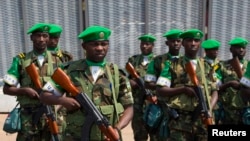The U.S. ambassador to the United Nations says the world body could learn lessons from Rwanda’s approach to peacekeeping. Speaking at a U.N. Security Council debate in New York this week, Ambassador Samantha Power said civilians in war-torn areas trust Rwandan peacekeepers to protect them. She also called on the international community to give regional peacekeeping organizations, like the African Union, full support.
A recent internal U.N. report found that its peacekeeping missions have routinely failed to use force to protect civilians under attack.
Referring to this report, Ambassador Power described it as troubling. She contrasted the U.N.’s performance with that of regional organizations, such as the African Union and the Economic Community of West African States, which she said have been willing to take on robust protection mandates.
She suggested the U.N. could draw lessons from Rwanda’s leadership in particular, as well as that of other countries like Ethiopia and Nepal.
Rwandan troops are in demand as peacekeepers, and currently about 5,500 of them are deployed with U.N. and AU missions, mainly in Darfur, South Sudan and the Central African Republic.
Kasper Agger, of the U.S. based anti-genocide organization the Enough Project, has observed the Rwandan troops with the AU mission in the C.A.R.
"I think they’ve done a good job. I mean they’ve been willing to put themselves on the line to protect civilians, to protect humanitarian workers. They also come from a country with a terrible history of genocide and particularly when the fighting was hitting a high (in C.A.R.), you got the feeling that the local population and the Rwandans could identify with each other’s experiences," stated Agger.
VOA observed Rwandan peacekeepers at work in the C.A.R. and asked local people what they thought of them.
Truck drivers transporting essential supplies into C.A.R. told VOA that when Rwandan soldiers were deployed to guard their convoys, they took the job seriously. For example, they would stay with any trucks that broke down instead of abandoning them, as other peacekeepers had.
Muslims in the capital, Bangui, told VOA it was the Rwandan and Burundian peacekeepers who defended them.
In the past month, Rwanda has deployed about 850 peacekeepers to South Sudan, where they are protecting one of the largest camps for displaced civilians, at Malakal. South Sudan expert Tag Elkhazin, director of the SubSahara Centre, suggests they can deter aggressors. "They are the ones with the heavy equipment. They have tanks. They are very well equipped, the Rwandan soldiers," she said.
Elkhazin said that unlike in C.A.R., the warring parties in South Sudan have far greater firepower than the peacekeepers. But he thinks the Rwandan and other U.N. troops still can fulfill their mandate.
"They are able to protect civilians within their compounds, and this is by default actually, not because the U.N. is that strong, but because neither the government of South Sudan nor the rebels would want to attack the compounds of the U.N. because their own people are in there," Elkhazin added.
In her speech this week, Ambassador Power recognized the challenges the U.N. and AU missions face, to train and equip troops, airlift them to war zones and keep them supplied. This, she said, is why the United States has contributed more than $500 million to AU missions in Somalia and in the C.A.R., and $166 million for African peacekeepers in Mali, as well as training 250,000 peacekeepers for African operations since 2005.
The ambassador emphasized that regional organizations, such as the African Union and the Economic Community of West African States, are playing a more central role in peacekeeping than ever before, and have proven swift and nimble in responding to serious crises. As they step forward, she said, they deserve full support.




